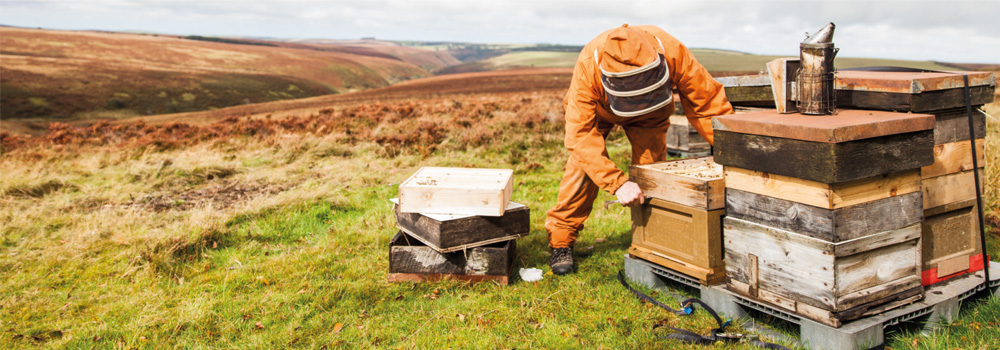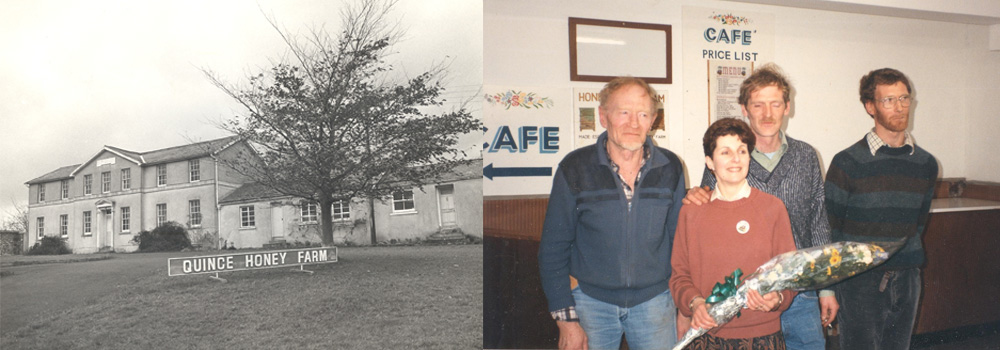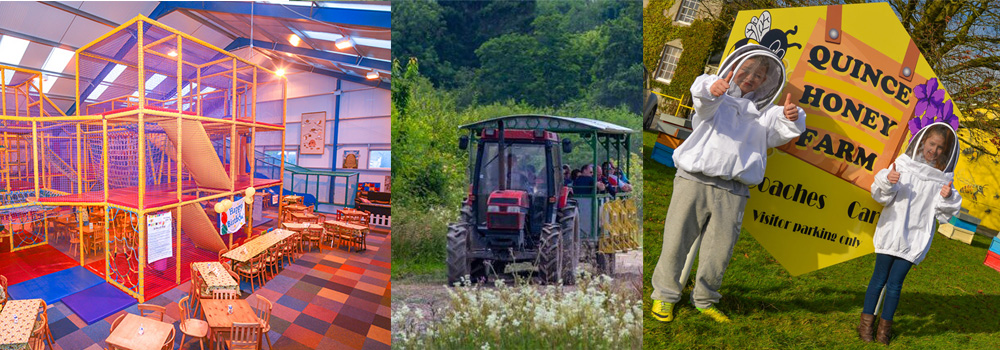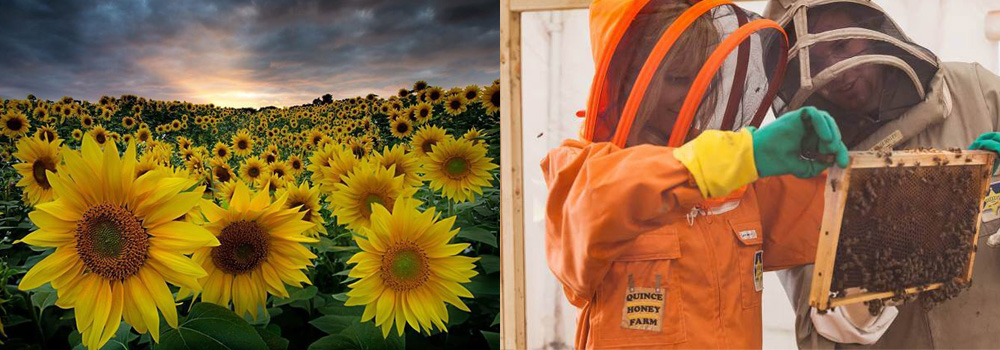If you have not been to North Devon before, or perhaps not South Molton then you might be wondering what is Quince Honey Farm? It is a honey farm and attraction that produces honey products and educates visitors into the life of bees.

History on the Attraction
The farm was first established in 1949 by George Wallace with only 2 hives and a dream of becoming the largest Honey Bee farm in Britain. In 1959 he moved his premises from a small family cottage named ‘Quince Cottage’ to the old school in South Molton. This bigger premises enabled him to grow the bees and business. His hive numbers quickly rose from 750 to 1500. This increase in numbers led him to move again to the old workhouse, South Molton in 1978. This site allowed, now the whole family (wife Kate, two sons Paddy and Jon and Paddy’s wife Jean) who worked in the business, to pursue the dream of creating an exhibition of honey bees.
Their exhibition soon became one of the best in the world during the ’80s with beekeepers across the globe acknowledging their mechanically operated observation hives created by Paddy. Then in the 90’s the business developed further with products being created and sold in the shop such as skin care products, honey marmalade, furniture polish and more.
Then in 2004, Paddy’s son Ian joined the business full time, a keen beekeeper and lover of the outdoors. It was Ian who helped to develop the business further and mould it into the tourist attraction it is today. Quince Honey Farm has also very recently moved again. This time re-locating to a larger site in South Molton that is filled with lots of activities.

What’s on offer
For the whole family
Talking of activities, Quince Honey Farm has lots going on. Join a guided tour of The Honey Factory which features a large ‘Products of the Hive’ exhibition and viewing windows into the honey production area. See how honey is extracted from the hive and then bottled in jars ready to sell in the shop.
If you want to learn how you might become a beekeeper then Quince Honey Farm has a range of ways to get stuck in. You can watch a live demo from behind glass, seeing how the beekeeper works with the bees. Take part in a 30-minute taster session where you work alongside a professional to get a taste for the beekeeper’s life. Or if you really want to get involved and want to become a beekeeper then take part in one of our Beekeeping experience days. You will learn everything there is to know about bees. The 2020 dates for these experience days have already been released and are very popular so check out their site for more information.
For those of you who love honey then the tasting session is a must. Each season the honey changes due to where the bees pollinate and on what plants. You will be able to sample a whole variety from Ivy to Heather, Oilseed Rape to local Devon Flowers, each tasting different.
The gardens at Quince Honey farm are another special feature. The centrepiece is the beautifully landscaped hexagonal gardens that can be explored and enjoyed all year round. Here visitors can take in the wonderful display of colours and textures, with seasonal planting and unique features such as dry stone walling and willow structures. All the planting here is bee and pollinator-friendly and is the first known gardens and woodland in the UK planted specifically for bees.
For the Children
Quince Honey Farm has something for all the family. If you are bringing along your little ones theres lots to keep them entertained. If your children want to get up and personal with the bees, they too can take part in a mini beekeeper experience. Or perhaps there are a few crafters in the family, in which case the candle rolling sessions are a perfect choice. Guided tours are a great way to learn more about bees. Or go on the beekeeping tractor tour to visit some of the local apiaries and learn about beekeeping through the seasons.
If that does not wear the little ones out then try the Critter Encounters (daily) where you can learn all about giant African snails and Stick Insects. Quince Honey Farm also boasts an excellent indoor play area called The Play Hive. It is the perfect place for children to run wild while adults can sit back in the surrounding seating and enjoy a Devonshire cream tea. Finally, visit the gift shop for lots of great products from honey to gifts and skincare.

Why bees are so important
Bees have been a hot topic on their importance to the environment, but why are bees so important? Bees alongside other insects pollinate crops, trees, flowers and more and contribute to the biodiversity of life. Bees are one of the best pollinators, it is estimated that they contribute to 80% of pollination. Without bees, we would experience a decrease in crop yields and essentially go hungry. Furthermore, it would affect our country and our farmers financially, with it estimated at £1.8 million for farmers to manually pollinate crops. Therefore, bees are pretty important, but how can you help?
Create more habitats for the bees; plant lots of bee-friendly flowers in your garden, create bee houses and hang them up in sunny spots in the garden. Try to reduce the number of pesticides you use in the garden. Finally, help a bee in need, if you spot one not moving in your garden it is likely to be exhausted. Mix two tablespoons of white, granulated sugar to one tablespoon of water and place it near the bee so it can help itself.

Where you can stay
If you want to go and visit Quince Honey Farm and are in need of somewhere to stay, Devon Farms has a wide range of excellent choices. Whether you want to stay in a cosy B&B or beautiful self-catering cottage we have something for everyone. North Devon is a fantastic holiday spot so be sure to take a look at what we have to offer.